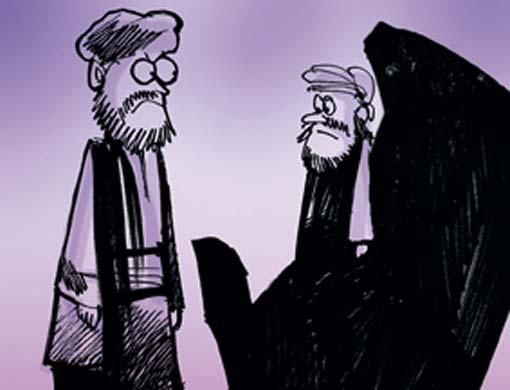Many people, including monarchs and presidents, have warned of imminent civil wars in more than one Arab country, particularly in Iraq, Palestine and Lebanon. The indications are there, they say. Regular armed clashes are taking place.
And except in the case of Lebanon, there seems to be no end in sight for the bloodletting.
But despite the deteriorating conditions, the situation has definitely not reached the level of civil war - in the true sense of the words. The political systems in those countries still stand and the judicial authorities exercise their powers through national police and security forces. There has yet to be a complete collapse.
Nevertheless, the situations in those states and in others across the region even those that enjoy superficial stability, can be empirically seen as worse than a civil war. Lebanon remained one state after the end of its long bloody civil war in 1990 with the signing of the Taif Accord. It managed to repair its institutions despite the Syrian hegemony and the frequent Israeli aggressions.
Intervention
What is more dangerous than a civil war is the religious and ethnic disintegration taking place in a number of Arab states. And unless there is an intervention of a stronger force to stop the deterioration, the disintegration will become territorial in the mid to long term.
When looking carefully into what is happening in Iraq, Palestine and Lebanon, one will see that those countries have indeed been divided into psychological mini-states; separate cantons which have nothing in common. Worse still, they are hostile to each other. Each has its own, and mostly different, interpretation of "national" history, a starkly different version of national allegiance, a conflicting vision for the future of the same country and a self-serving standard of patriotism where the others are traitors -foreign agents of course.
A key principle of statehood according to Ibn Khaldun in his famous book Muqqadimah (The Introduction) is nationalism - expressing allegiance to the nation by a group of people who live on a certain patch of land. In modern times, it is expressed by a national flag, national anthem, shared currency and even a national football team.
Most emerging mini-states, within the one increasingly divided state, stick to the national flag, like the rival demonstrations in Lebanon over the past two months. The Iraqi flag is also the same one that would be, for example, visible behind Prime Minister Nouri Al Maliki of Iraq and at the same time splashed all over the screen of Al Zawra satellite channel that calls Al Maliki a traitor and urges its viewers to kill him and the rest of his ruling coalition. The Palestinian flag is the same one carried by Hamas protesters who denounce President Mahmoud Abbas and the demonstrators from the Abbas-led Fatah movement who swear to overthrow the Hamas government.
In Lebanon, rival groups compete on who would carry more cedar flags. But the ordinary citizens realise that the Lebanese flag has become a fake badge of patriotism. They know the real flags, to which those groups pay real allegiance, are the partisan and sectarian banners.
In Lebanon too, rival groups don't make secret of their foreign alliances that totally conflict with the alliances of other groups. These groups differ in almost everything. They have different readings of the country's history. Even that of such relatively recent events as the civil war or more recent like last summer's Israeli war against Hezbollah.
Arab 'flavour'
Some Lebanese mini-states believe Hezbollah won the war. But others say it was a humiliating defeat. Some were even ready to surrender to Israel even as Hezbollah fighters were shooting down enemy planes and destroying Merkava tanks.
Some mini-states consider former warlord Samir Geagea a war criminal whilst others see him as a patriot fighter and liberator. He was convicted in 1994 of murdering a former prime minister during the bloody civil war.
Most importantly, those mini-states disagree on what is Lebanon. Some want it part of Europe with an Arab "flavour" and others believe it should be an integral part of the Arab-Muslim nation.
The same can be said about a number of Arab countries where the perception of stability could well be a façade behind which there exists more than one mini-state looking to declare independence, when the time is right.










